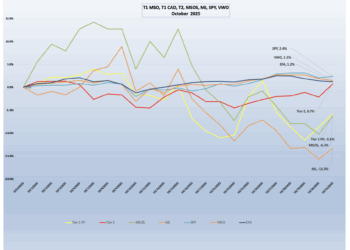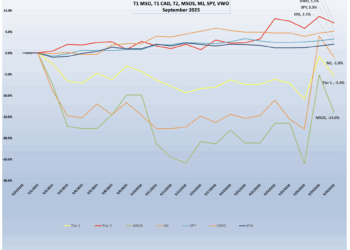It has been more than 19 months since President Joe Biden injected life (or at least, hope) into the cannabis industry with his passionate appeal for cannabis reform, with particular focus on decriminalization and Drug Enforcement Administration (DEA) rescheduling. And it has been four months since the infamous leaked memo from the Department of Health and Human Services to the DEA recommending that marijuana be moved “down the list” from Schedule I to Schedule III.
By the time this newsletter is released, there will have been (conservatively) tens of thousands of words written by virtually every news outlet (including ours) about drug rescheduling, and we assure you that there will be no new revelations here in this newsletter. Suffice it to say, all ambiguities aside, this news is positive for the cannabis industry, even for the perception of it alone. With that said, CRB Monitor will endeavor to apply our decade-long experience in cannabis regulations and licensing, combined with our capital markets expertise to provide a common sense approach to this complex, yet-to-be resolved saga.
Cannabis-Linked Equity Performance
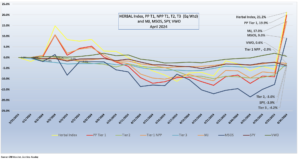
The bombshell news on April 30 about cannabis rescheduling is essentially still a rumor spread throughout the world like wildfire. Those of us close to this industry have been following the story since, and it is interesting how it has motivated industry participants, politicians and investors. With that said, here is the April 2024 cannabis investment news:
The Nasdaq CRB Monitor Global Cannabis Index (HERBAL), a mix of Pure Play Tier 1 and Tier 2 CRBs weighted by both investability and strength of theme (SOT), had a strong April thanks in large part to the AP story on April 30. A full description of HERBAL’s strengths and benefits can be found in Introducing: The Nasdaq CRB Monitor Global Cannabis Index. HERBAL outperformed the cannabis field in April, posting a return of 21.3%.
The two largest U.S. plant-touching cannabis-themed ETFs, the Amplify Alternative Harvest ETF (NYSE Arca: MJ) (+17.0%) and the MSO-heavy Advisorshares Pure US Cannabis ETF (NYSE: MSOS) (+9.0%), performed well in April following their strong performance in March. Unlike HERBAL, which is designed to be Controlled Substances Act (CSA)-friendly, these two funds with U.S. plant-touching MJ exposure tend to be more sensitive to the US regulatory rollercoaster.
MJ’s performance has a high potential to deviate from HERBAL’s (and other cannabis-themed ETPs) due to its current unconventional composition. Since its origin, MJ has held a significant percentage of non-pure play (and in a few cases, non-CRB) holdings, more specifically tobacco stocks and Tier 3 companies with either very small or no cannabis exposure at all. Additionally in 2022, MJ added and maintains close to a 50% US plant-touching component via a holding in its sister fund, MJUS. The U.S. plant-touching component also has the potential to impact MJ’s eligibility on investment platforms that restrict U.S. cannabis exposure. It is also important to note that both MJ and MJUS are now operating under a new issuer, Amplify ETFs.
Monthly returns of the self-described (and largest) U.S. plant-touching ETF, MSOS, can also deviate materially from HERBAL’s as well (as it did in April), largely due to its significant holding in CRBs with U.S. marijuana touch-points.
The performance of the recently-expanded CRB Monitor equally-weighted basket of top Pure Play Tier 1 CRBs by market cap performed well in April, returning +19.9%. This basket, which is an equally weighted portfolio of the 22 largest pure play CRBs (including both U.S. plant-touching and non-U.S. plant-touching MJ companies), had a return that was a reflection of the wide range of performance across the entire Tier 1 pure play space. We will take closer look at some of these below.
The also-expanded CRB Monitor equally-weighted basket of Tier 2 CRBs finished the month behind the Tier 1 CRB basket, posting a -3.0% return for April 2024. In February we published an update to our piece on correlations of pure play Tier 1 and Tier 2 CRBs (among other tiers and baskets). And what we have observed historically is that these two groups tend to display high correlation (~0.75) in the long term, while their respective performance has a tendency to diverge in the short term. This can be due to (among other factors) the lag from the impact (positive or negative) of market forces that affect their sources of revenue that are derived from the Tier 1 group. If this theory holds, investors would be expected to load up on Tier 2 CRBs in the short term and we would witness this gap narrow over time.
U.S. equities and bonds cooled off in April as investors saw a decline in the markets due to a shifting interest rate outlook. The Fed kept a close watch on inflation and unemployment numbers and lowered the projected number of Federal Reserve rate cuts this year. The S&P 500 (represented by the SPDR S&P 500 ETF Trust (NYSE Arca: SPY) posted a -3.9% return for the month (now +6.5% YTD) and added to its record-setting gains.
Largest Tier 1 Pure Play & Tier 2 CRBs by Mkt Cap – April 2024 Returns
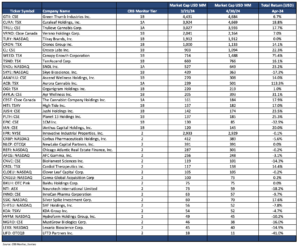
CRB Monitor Tier 1
An equally weighted basket of the largest Tier 1 pure-play cannabis equities posted a +19.9% return in April, which was its second positive double-digit month in a row. We saw incidence of spectacular returns coming from both the MSO (U.S. plant-touching) group and Canadian (CSA-friendly) CRBs. Investors in the space benefitted from a number of high performing cannabis stocks. Let’s take a look at some of the highlights:
As we can see in the chart at the top of this report, cannabis-lined equities performance was moseying along mostly in negative territory until the April 30 rescheduling announcement. Then as soon as the dogs were released, we saw a spike in returns for most CRBs in the MSO basket. Tier 1B Cresco Labs Inc. (CSE: CL) (+22.3%), Tier 1B Verano Holdings Corp. (CSE: VRNO) (+7.0%), Tier 1A Curaleaf Holdings, Inc. (CSE: CURA) (+18.8%), Tier 1B TerrAscend Corp. (TSX: TSND) (+16.1%), Tier 1A CRB The Cannabist Company Holdings Inc. (CBOE Canada: CBST) (+17.9%) and Tier 1B MSO Green Thumb Industries Inc. (CSE: GTII) (+6.7%) all reversed their negative performance at month end. Tier 1B Trulieve Cannabis Corp. (CSE: TRUL) (+17.7%), continued its meteoric rise following the recent news that it seeks to recover more than $100 million in Schedule 280-E taxes that Trulieve paid historically.
Companies that make up the Canadian CRB basket were led in April by Tier 1A Aurora Cannabis (TSX: ACB) (+113.3%), which had a one-day return of 44% on April 3. Analysts believe that it’s ACB’s positioning in the global cannabis space combined with positive news in North America that have combined to more than double its stock price in the month of April. This quote from Mark McKelvie at TheNewsWire:
“Aurora Cannabis (NASDAQ: ACB) is strategically positioned to capitalize on recent developments in the global cannabis landscape. With Germany’s historic step towards cannabis legalization and Aurora’s recent third-quarter results for fiscal year 2024, the company’s trajectory in international markets warrants closer examination. In Q3 2024, ACB reported robust financial results, signaling its resilience and growth potential. The company achieved a net revenue increase to $64.4 million, up from $61.1 million in the prior-year period. This growth was driven by a stronger performance in Aurora’s global medical marijuana business, showcasing the company’s ability to navigate market dynamics effectively. Moreover, ACB demonstrated improvement on the bottom line, with adjusted EBITDA reaching $4.3 million, compared to $3 million in the same period last year. Importantly, this marks the fifth consecutive quarter where Aurora has posted positive adjusted EBITDA, highlighting its financial stability and operational efficiency.”
Other winners from the Canadian basket included Canopy Growth Corporation (TSX: WEED) (+75.4%), Tier 1A SNDL, Inc. (Nasdaq: SNDL) (+23.2%), and Tier 1B Cronos Group Inc. (TSX: CRON) (+14.1%), all of which benefitted from positive news both across the border and overseas. Tier 1B Tilray Brands, Inc. (Nasdaq: TLRY) was flat in April 2024.
CRB Monitor Tier 2
An equally weighted basket of the largest CRB Monitor Tier 2 companies posted a negative 3.0% return for April 2024, which underperformed the equally weighted Tier 1 basket by 22.9%. Typically these two baskets are highly correlated (please see our February 2024 “Chart of the Month”), and we expect the returns of Tier 1 and Tier 2 CRBs to even out over time. When these two portfolios deviate from one another (as they did in February and then changed places in April), it could be a signal for investors to rebalance into (or out of) the Tier 1 basket and out of (into) Tier 2’s given their direct revenue relationship, but the precise moment when these two baskets mean revert is not easy to predict. Furthermore, the costs required to systematically rebalance these illiquid baskets could eat up any expected material gains from even the best rebalance strategy. In other words, gaming these two baskets can be a losing strategy, so beware!
The largest CRB in the basket, Tier 2 REIT Innovative Industrial Properties, Inc. (NYSE: IIPR) (CRBM Sector: Real Estate) (-0.1%), was flat after two months of positive returns following optimistic Q4 2023 earnings in February.
Finally, another Tier 2 REIT, AFC Gamma, Inc. (Nasdaq: AFCG) (CRBM Sector: Real Estate) (-3.1%) gave back some of its positive March performance in April as investors prepared for first quarter financials.
It remains to be seen if AFCG can maintain its momentum following a mid-March announcement that AFCG “has provided a total of $34.0 million in debt capital across two senior secured credit facilities to High End Holdings, LLC and Green Sentry Holdings, LLC d/b/a Sunburn Cannabis… a private, vertically integrated, single-state Florida operator. Sunburn intends to use the proceeds from the credit facilities to refinance existing debt, provide working capital, and build additional cultivation and processing facilities and new retail dispensaries in its business plan.”
CRB Monitor Securities Database Updates
CRB Monitor’s research team monitors the information cycle daily and maintains securities’ profiles to reflect the current state of the cannabis ecosystem. Here is a summary of the updates for April 2024:
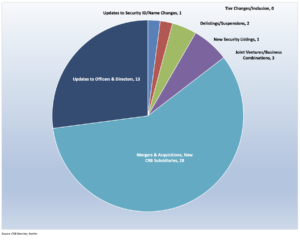
Cannabis Business Transaction News
The cannabis business news cycle continues to merrily roll along, and CRB Monitor’s analysts go to the ends of the earth to track all the relevant news that should be of use to all of those who take an interest in this volatile industry. The goal is not only to inform our subscribers but to ensure that the CRB Monitor database accurately reflects this active global news cycle every day.
Here are some of the highlights from April 2024:
Tier 1A Flora Growth Corp. (NASDAQ: FLGC) announced in an April press release that it “has entered into a binding Letter of Intent to acquire TruHC pharma GmbH in an all-stock deal in exchange for 2,770,562 Flora common shares, valued at $6.4 million based on the closing price of the Flora Growth shares on March 28, 2024 of $2.31 per share. The first tranche of transaction is expected to close in the second quarter of 2024. Flora’s wholly-owned subsidiaries have been active in Germany since 2017, obtained the first medical cannabis license in Germany and are responsible for selling the first gram of medical cannabis in the country. With its acquisition of TruHC, Flora cements its position at the forefront of this historic German and European cannabis opportunity.”
Following this M&A deal, Flora Growth’s global license footprint consists of eight cannabis licenses representing operations in five countries (Germany, Switzerland, Portugal, Colombia and Denmark). The press release goes on to say, “The acquisition brings an already successful partnership between Flora and TruHC under the Flora brand, providing the potential to unlock greater economic value from future distribution in Germany and Europe.”
Vext is in the news again: Tier 1B MSO Vext Science, Inc. (CSE: VEXT) issued a press release in April announcing it “has completed the acquisition of real property associated with a cannabis dispensary in Athens, Ohio as part of the previously disclosed Ohio Expansion Transaction. As consideration for the Property Acquisition, the Company has paid aggregate consideration of $2.6 million, consisting of $0.9 million in cash and the issuance of a promissory note in the principal amount of $1.7 million.”
With this new acquisition, Vext’s active license count is now 14 with operations in Ohio, Arizona and Oklahoma.
Tier 1B Canadian CRB High Tide Inc. (TSXV: HITI) announced in April that its Canna Cabana retail cannabis store located at 2901 Eglinton Avenue West, Mississauga, Ontario will begin selling recreational cannabis products and consumption accessories for adult use on April 8. With this opening, High Tide’s license count has expanded to 217 with operations in six Canadian provinces, plus Australia.
“This opening will mark High Tide’s 168th Canna Cabana branded retail cannabis location in Canada, the 59th in the province of Ontario and the 5th in the city of Mississauga. Located in the west end of Mississauga, this brand-new Canna Cabana sits within a major power center featuring a prominent Canadian home improvement retailer, a large provincial beer retailer, an established grocery chain, and several quick service restaurants. The new store is also well positioned to serve over 100,000 residents who live within a three-kilometer radius,” according to the press release.
Also in April, Wakefield, Mass., Tier 1A MSO Curaleaf Holdings, Inc. (CSE: CURA) issued a press release announcing “the closing of its acquisition of Northern Green Canada (“NGC”), a vertically integrated Canadian licensed cannabis producer focused primarily on expanding in the international market through its EU-GMP certification. The accretive acquisition amplifies the Company’s strategic advantage in established European markets including Germany, Poland and the United Kingdom and provides a foothold in the emerging markets of Australia and New Zealand.”
The announcement goes on to say, “Integrating NGC’s international operation will equip Curaleaf with a secure and consistent high quality, non-irradiated, indoor EU-GMP flower supply, essential to maintaining its leading positions in Germany, the United Kingdom and Poland…Terms of the acquisition of NGC include an initial payment at closing of the Company’s Subordinate Voting Shares valued at approximately US $16 million, subject to a typical post-closing adjustment. An earnout may also be paid in 2025 based upon 2024 performance of NGC’s operations, up to 50% of which will be cash and the rest paid in additional Subordinate Voting Shares. The issuance of Subordinate Voting Shares in connection with the acquisition of NGC has been conditionally approved by the Toronto Stock Exchange, subject to fulfilling customary listing conditions.”
Curaleaf holds, directly and through its subsidiary businesses, 135 cannabis licenses (that are either active or pending approval) and operates in six countries.
Now from the “Wow, this news is long overdue” department: In April, Tier 1B MSO MedMen Enterprises Inc. (CSE: MMEN) announced it “made an assignment into bankruptcy pursuant to Canada’s Bankruptcy and Insolvency Act on April 24, 2024 and B. Riley Farber Inc. was appointed as the Company’s bankruptcy trustee. The Company’s Chief Financial Officer, Amit Pandey, resigned effective as of February 13, 2024 and each of the Company’s directors resigned effective immediately prior to the commencement of the Bankruptcy Proceedings… The difficult decision to shut down operations and commence the Bankruptcy Proceedings and Receivership Proceedings was made after careful consideration of the current financial condition of the Company and its subsidiaries, their inability to pay their liabilities as they become due and the anticipated enforcement actions of secured creditors. After careful consideration of these factors and in the absence of other available alternatives, the board of directors of the Company determined that it was in the best interests of the Company to proceed with the commencement of the Bankruptcy Proceedings and Receivership Proceedings.”
An April 30 article in MJ Biz Daily added some insight to the story: “The developments usher in the end of the company’s days as a marijuana multistate operator and cement perhaps the most precipitous downfall in the marijuana industry to date. With creditors reporting more than 560 million Canadian dollars ($410 million) in claims, MedMen likely represents the largest failure in U.S. and Canadian marijuana retail history. At one point, the company operated more than 20 stores nationwide, including about a dozen in California.”
Medmen, now with 31 of its 112 cannabis licenses in “active” status, operates in seven states (Nevada, California, New York, Massachusetts, Florida, Virginia and Illinois).
Finally, Tier 1B MSO Planet 13 Holdings Inc. (CSE: PLTH) issued an April 29 press release announcing it “has received approval for the proposed sale of Planet 13 Florida, Inc., and approval for the proposed acquisition of VidaCann, LLC each of which owns a Medical Marijuana Treatment Center License, from the Florida Office of Medical Marijuana Use (“OMMU”). The approvals from the OMMU for the sale of Planet 13 Florida and the acquisition of VidaCann are the final regulatory approvals required for Planet 13 to close the Transactions. The Company has extended the end date of the VidaCann acquisition to May 31, 2024 and currently expects to close the Transactions in May 2024.”
While the potential long-term impact of this simultaneous sale/purchase remains to be seen, it appears that it was a necessary response to 1) internal misdealing’s that had to be resolved and 2) Florida allows just one operating license per licensee. Currently Planet 13 operates in four states (Florida, Nevada, Illinois and California) and holds 26 licenses that are either active or pending approval.
Select CRB Business Transaction Highlights
Officers/Directors Highlights
| Company Name | Ticker Symbol | CRBM Tier | Event |
| Decibel Cannabis Company Inc. | TSXV: DB | Tier 1A | Decibel Appoints Benjamin Sze as CEO |
| Canopy Growth Corporation | TSX: WEED | Tier 1B | CBI Conversion to Exchangeable Shares and Newly Constituted Board of Directors (CANOPY GROWTH CORP) |
| MedMen Enterprises Inc. | CSE: MMEN | Tier 1B | MedMen Announces Entering Bankruptcy Proceedings and Resignation of CFO and Directors |
| Charlotte’s Web Holdings, Inc. | TSX: CWEB | Tier 1B | Charlotte’s Web to Elect New Directors |
Select Updates to CRB Monitor
| Name | Ticker Symbol | CRBM Action | CRBM Tier/Sector |
| Nature’s Miracle Holding Inc. | NASDAQ: NMHI | Added to DB | Tier 1B/Owner-Investor |
| Ridgedale Holdings Inc. | OTC Pink: RDGH | Deleted | Tier 2/SPAC |
| Thorne Healthtech, Inc. | NASDAQ: THRN | Moved to Watchlist | Tier 3/Personal Products |
| Gesher I Acquisition Corp. | NASDAQ: GIAC | Deleted | Tier 2/SPAC |
| VirExit Technologies, Inc. | OTC Pink: VXIT | Moved to Watchlist | Tier 3/CBD – Online Wholesale & Retail |
Cannabis News: Regulatory Updates
From a regulatory perspective, the most important and impactful story came right at the end of April with the rumor that the DEA was finally on a path toward rescheduling marijuana. And while the rumor was not confirmed until two weeks later, the market for cannabis equities reacted in kind. We witnessed a significant, knee-jerk lift across all boats in the space. Investors and casual observers alike might wonder what caused this hysteria, as it tends to happen to cannabis stocks both on the positive side and the negative. Truth be told, with an industry that sports weak (or negative) profits, poor liquidity and wide bid/ask spreads, it should be no surprise when prices move by double digit percentages in one day. And it is an understatement when we say that our CRB Monitor News team is following this story closely, as it will undoubtedly be a game changer for the cannabis industry.
While the rescheduling rumors and the associated market response tended to eclipse any other regulatory news in April, we were on top of all the relevant stories that provided investors and observers with insights into the legal cannabis space. Here are some highlights from the cannabis regulatory news cycle:
In April the CRB Monitor News team seized on this story out of the state of Missouri. In their article entitled Missouri Revokes Nine of 48 Social Equity Microbusiness Licenses, our team reported, “Nine of the 48 social equity cannabis licenses that Missouri dished out last fall have been revoked following claims that out-of-state actors were improperly backing local social equity candidates. Eight of those licenses did not meet ownership rules for microbusinesses.”
In an apparent blow to the social equity cannabis program in the state, Missouri cited several reasons for the revocations. In the words of the article, “In a March 27 statement, the Missouri Department of Health and Human Services said the purported majority owners had ‘limited to no knowledge or understanding of agreements or operations.’ In some cases, the social equity owner did not even know the person who applied for the license on their behalf. ‘While owning and operating a license may include contracting for management services or consulting services, the lack of knowledge, control, agency or decision-making demonstrated by the individuals whose information was used to meet eligibility does not meet even the most generous interpretation of owning and operating a business,’ said Amy Moore, director of the Division of Cannabis Regulation in the statement.”
Next, we have news out of New Hampshire, where Marijuana Moment reported in April that, “The New Hampshire House passed another adult-use cannabis legalization bill, but getting it through the Senate has been a perennial challenge. The legislation passed… in the House would allow 15 medical marijuana dispensaries to sell recreational cannabis under regulation of the New Hampshire Liquor Commission, according to New Hampshire Public Radio.”
The article notes that New Hampshire is the only New England state that has not legalized marijuana for recreational use – this has undoubtedly cost the state millions of tax dollars as residents cross the border into Massachusetts and Maine to fulfill their cannabis needs. “Advocates, operators and consumers hope this is the year, considering outgoing Republican Gov. Chris Sununu and key GOP senators have signaled an openness for approval. However, the Senate roadblocked legalization efforts last year and a similar measure in 2022. Republicans have a trifecta in New Hampshire, controlling the governorship and both chambers.”
Now onto Florida, where an April article in MJ Biz Daily reported that the state’s Supreme Court ruled in favor of an industry-funded ballot initiative, and Florida voters will have a chance to either approve or reject adult-use cannabis in November.
“Lawyers for state Attorney General Ashley Moody had argued the Smart & Safe Florida initiative, known as Amendment 3, was misleading to voters. They also argued that it would unfairly entrench the market dominance of Tallahassee-based marijuana multistate operator Trulieve Cannabis, which has to date contributed more than $40 million toward the effort,” according to MJ Biz Daily.
The news report added, “… in a 5-2 decision Monday, the state Supreme Court ruled that the measure indeed ‘conforms’ to state constitutional requirements. ‘In light of those limited considerations, we approve the proposed amendment for placement on the ballot,’ the justices wrote. If passed by 60% of voters in November, Amendment 3 would allow recreational cannabis sales to Floridians 21 and older at existing medical marijuana treatment centers.
Those age 21 and up also may possess up to 3 ounces of cannabis for personal use. No home growing would be allowed.”
And it’s bad news for cannabis advocates in Kansas, where Marijuana Moment reported that “The Kansas Senate has rejected a motion to revive a medical marijuana legalization bill after a GOP member forced a vote on the issue. The chamber struck down the motion to take up the bill from Sen. Robert Olson (R) in a 12-25 vote. This comes weeks after a legislative committee shot down a separate medical cannabis pilot program bill. The legislation Olson sought to bring up, SB 135, was shelved by a legislative panel a year ago amid pushback from law enforcement.”
Kansas, which is one of just a few states where cannabis is still fully illegal, has frustrated many of its residents that are waiting patiently for years to see the passage of some form of legalization.
“Sen. Cindy Holscher (D) was among those who voted in favor of the proposal on Friday, and she said that ‘over the past three weeks, scores of Kansans have reached out to their senator voicing support for medicinal cannabis—as they have done for nearly the past decade…Sadly, supporters have faced many hurdles on this important measure time and time again,’ she said. ‘Today, we’ve been given a unique opportunity to move this measure forward, which is supported by a majority of Kansans,'” according to Marijuana Moment.
Finally we turn to New Mexico, where it was reported in April by our CRB Monitor News team that, “New Mexico cannabis regulators are concerned about reports that licensed cannabis businesses have recently had their products seized by U.S. Customs and Border Protection (CBP) agents at checkpoints, and they are trying to get to the bottom of it. Border patrol agents claim they have been ordered to begin seizing cannabis at checkpoints, according to news reports. The seizures have been occurring for at least two months. The CBP has made at least 13 stops and seizures since February, Ben Lewinger, executive director of the New Mexico Cannabis Chamber of Commerce, told Marijuana Moment. The New Mexico Regulation & Licensing Department’s Cannabis Control Division, which is responsible for licensing cannabis businesses, is aware of the recent seizures at federal checkpoints.”
It is difficult to unpack all of this, but one take that we can offer is that cannabis, even when licensed by state regulators, is technically not universally legal and holders of cannabis must be aware of this fact. So beware of federal agents, regardless of the legalities of your state! The article goes on to say, “The CBP is allowed to operate within 100 miles of the U.S. border. The drivers were reportedly transporting product from the southern part of New Mexico to stores or labs in the northern part of the state. Until recently, they had no problems. While the U.S. Department of Justice is legally prohibited from enforcing federal cannabis laws in states with legal programs, the CBP is under the Department of Homeland Security, a completely separate agency.”
CRBs In the News
The following is a sampling of highlights from the April 2024 cannabis news cycle, as tracked by CRB Monitor. Included are CRB Monitor’s proprietary Risk Tiers.
Wondering what a Tier 1, Tier 2 or Tier 3 CRB is?
See our seminal ACAMS Today white paper Defining “Marijuana-Related Business” and its update, Defining “Cannabis-Related Business





